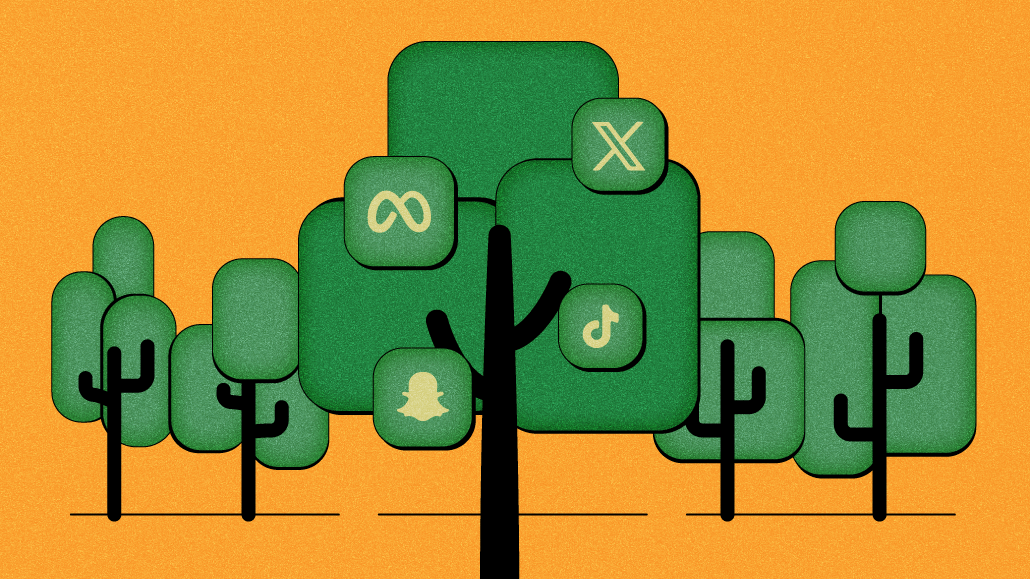Secure your place at the Digiday Media Buying Summit in Nashville, March 2-4

The dream was that someone — anyone, really — could build a brand without spending any money. All the brand marketer of the future needed was time, an idea and Final Cut Pro. Wieden+Kennedy, Super Bowl and multi-hyphenate marketers slots would soon be history.
One of the prophets of that dream was Gary Vaynerchuk, who once told a convention audience: “Shit’s changed. The ship has sailed.” That was 14 years ago. Since then, algorithms have been altered. Weird Twitter came and went. Influencers say they find it all but impossible to get in front of their own Instagram followers. But Vaynerchuk, despite having founded a successful paid social media agency, argued that organic social should be “the starting point for marketing“ to Possible conference attendees in Miami last week.
“It’s a major issue. Shit, it’s 2024. It’s time to finally take some of this stuff seriously,” he said. “Organic social is the starting point for marketing, and at this conference, it’s the 20th most important thing to brands.”
Vaynerchuk might be right — organic social is far down the priority list for most chief marketers. But when publishers and influencers producing original content can’t get a look-in using organic social and when TikTok, one of the last platforms marketers credit any organic success to, is set to be banned in the U.S., what hope does a retailer or consumer packaged goods brand have? Digiday has delved into the debate, weighing the arguments for and against marketers relying on organic social.
The case against organic social
The days when brand marketers could reach massive audiences with low-effort social posts “are well and truly over,” said Gareth Harrison, a strategist at U.K. social agency SocialChain.
The engagement well has been drunk dry, Harrison argued. When other brands began using the same friendly tone as PaddyPower or RyanAir, he argued, it eroded the distinction between them. “Their voice is being drowned out by the sound of other brands copying that style of messaging,” he added.
Callum McCahon, executive strategy director at Born Social, said the agency stopped recommending marketers focus on organic social almost five years ago. “If you’re looking at social, just focus on paid because that’s the only way you can guarantee any results,” he recalled advising clients.
Tom Sneddon, co-founder and managing director of social agency Supernova, said that organic is at best, a single tool in the marketing shed. “I’ve never built a brand exclusively off organic. It’s a weapon at our disposal; you have to pull a few different levers. Anyone who claims they do is telling you only half the story,” he said.
Ryanair’s self-aware TikToks might help it recover goodwill among European holidaymakers, but it won’t help it out-compete rival budget airlines.
“Organic social is massively misunderstood. It was never built for scale and it was never built for assuming social was free,” added Sneddon. “You are not going to get in front of the people you need to get in front of quickly by doing it organically.”
The case for organic social
In truth, the case for organic social is really a case for word-of-mouth recommendation and for targeting specific online communities. Social platforms that emphasize community engagement, such as Reddit, still encourage brands to use the organic route to reach consumers; the platform released free organic marketing tools just a few months ago.
For Sneddon, “word-of-mouth remains the single biggest motivator for brand trust. That is really hard to scale with reach… [but] it’s really easy to scale with engagement.” Even today, he argued, that is still possible for a brand that has chosen its time and place well. “If you can find a community, a location, a passion point and build positive sentiment around it through highly engaged, highly targeted, highly memorable moments I can absolutely prove to you the value of organic social,” he said.
During last week’s London Marathon, for example, Supernova client Back Market — an e-commerce retailer specializing in refurbished tech — used its social presence to pluck out examples of runners crediting their race success to refurbed tech products. ”It’s less about selling and actually about presenting the benefits and the values,” said Sneddon.
Stephanie Schafer, president and chief growth officer at Minnesota agency The Social Lights argued in favor of keeping organic social as an experimental channel. From a reach perspective, she conceded, “Organic doesn’t make as much sense as it used to. However, it’s a great test and learn.“
Marketers can try out new types of content or messaging without having to risk significant media spend, she said. “That’s a huge benefit of continuing an organic strategy in addition to having paid support.“
For McCahon, TikTok, YouTube Shorts and Instagram Reels have changed the advice Born Social has been dishing out. The former is now a “mainstay” of organic social client plans, he said.
In response to client demand, the agency launched a newsroom service producing reactive short-form video on behalf of brands. “Earned reach is now a thing again on social,” he added. That said, it’s not the only pillar. McCahon said he recommends clients pursue organic but use paid social to boost high-performing creative, alongside creator partnerships in service of “one cohesive story… one clear strategy you’re taking to consumers.”
More in Marketing

Future of Marketing Briefing: AI’s branding problem is why marketers keep it off the label
The reputational downside is clearer than the branding upside, which makes discretion the safer strategy.

While holdcos build ‘death stars of content,’ indie creative agencies take alternative routes
Indie agencies and the holding company sector were once bound together. The Super Bowl and WPP’s latest remodeling plans show they’re heading in different directions.

How Boll & Branch leverages AI for operational and creative tasks
Boll & Branch first and foremost uses AI to manage workflows across teams.








